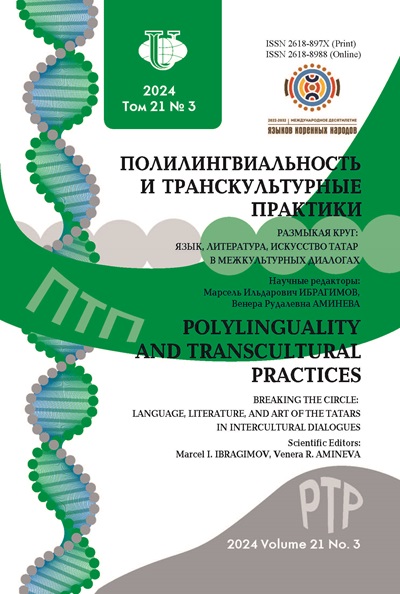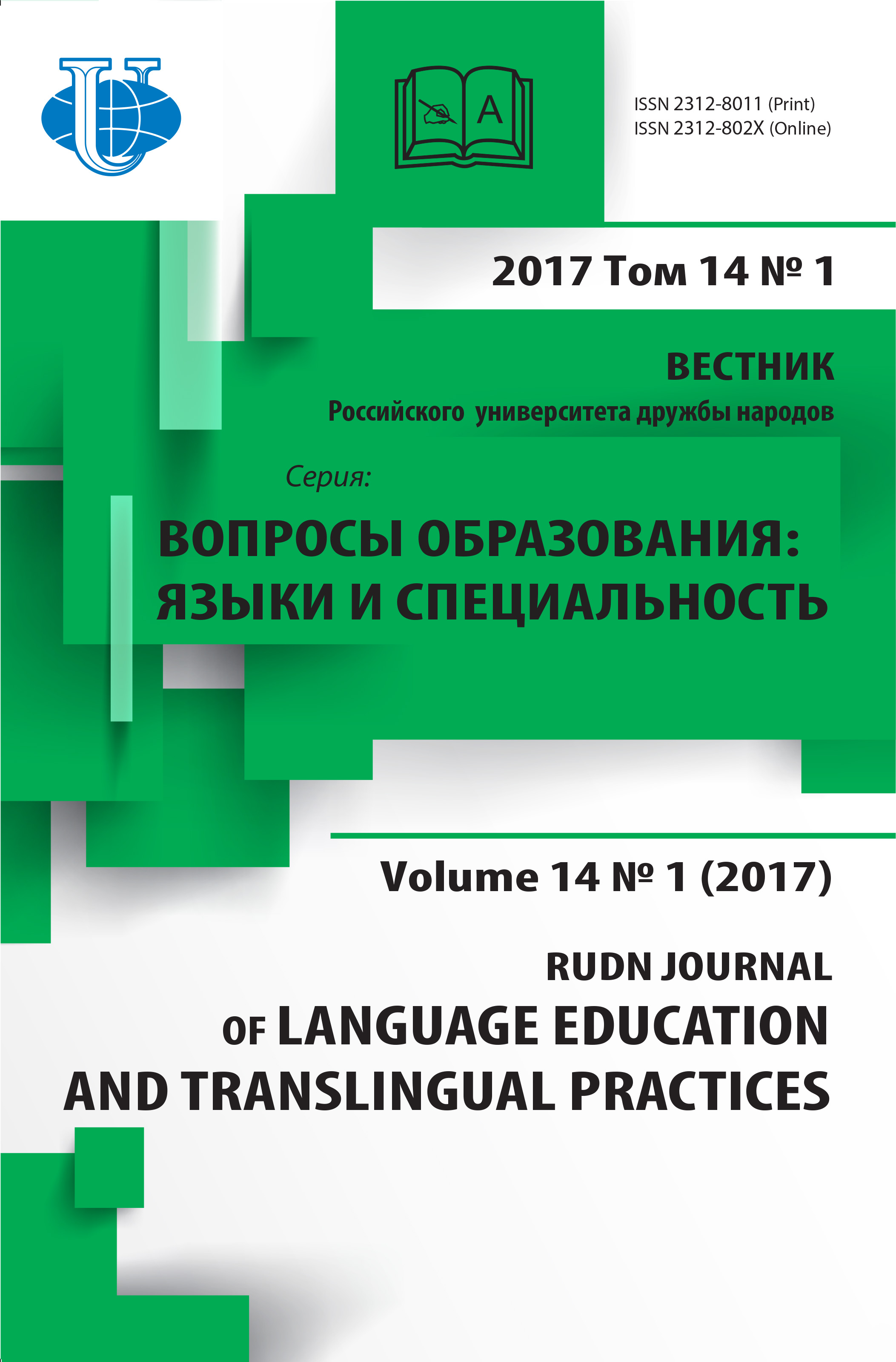ONLINE-TANDEM IN POST-INTERCULTURAL COMMUNITY: SELF-EDUCATION IN COOPERATION
- Authors: Kudryavtseva E.L.1, Bubekova L.B.2
-
Affiliations:
- International laboratories with the distributed participation at the Yelabuga instituteof the Kazan federal university - the Udmurt state university - the Aktyubinsk university of S. Baishev, Guestro (Germany)
- Yelabuga institute of the Kazan federal university
- Issue: Vol 14, No 1 (2017)
- Pages: 18-27
- Section: ARSENAL
- URL: https://journals.rudn.ru/polylinguality/article/view/15949
- DOI: https://doi.org/10.22363/2312-8011-2017-14-1-18-27
Cite item
Full Text
Abstract
The concept “cultures” lost a clear boundary today: only in the sphere of studying and teaching foreign languages it is possible to speak about the standard of speech - verbal and nonverbal aspect; to culture of behavior, culture of clothes, etc.; and, ethnic and social and defined norms adapt to various to situational contexts. For this reason and because of inter-object approach [1. P. 2] to studying of cross-cultural communication - borders of “cross-cultural communication” become more and more indistinct. It can take place between representatives of various cultures on one geographical space (i.e. in one polycultural society) and terms of uniform single-crop community, but consisting of representatives of various floors, generations, professions or social groups. From here need of more detailed approach to expansion of cross-cultural communication results including at learning of foreign languages; and to orientation of the post-integration work (directed on voluntary deep integration with self-identification preservation) - by use of online tandems with carriers of target languages and ethnocultures as native.
About the authors
Ekaterina Lvovna Kudryavtseva
International laboratories with the distributed participation at the Yelabuga instituteof the Kazan federal university - the Udmurt state university - the Aktyubinsk university of S. Baishev, Guestro (Germany)
Author for correspondence.
Email: ekoudrjavtseva@yahoo.de
the candidate of pedagogical sciences (PhD), the research supervisor of the International laboratories with the distributed participation at the Yelabuga institute of the Kazan federal university - the Udmurt state university - the Aktyubinsk university of S. Baishev, Guestro (Germany)
18276, Hägerfelder Weg 4, Gutow, GermanyLarisa Borisovna Bubekova
Yelabuga institute of the Kazan federal university
Email: bular@yandex.ru
the candidate of Philology, the associate professor, managing the International laboratory with the distributed participation “Innovations in the polycultural educational environment” at the Yelabuga institute of the Kazan federal university, Yelabuga (Russia)
423600, Kazanskaja str., 89, Elabuga, RussiaReferences
- Matoba K., Scheible D. Interkulturelle und transkulturelle Kommunikation. Working Paper of International Society for Diversity Management e.V., 2007 № 3. Digital resource. URL: http:// www.idm-diversity.org/files/Working_paper3-Matoba-Scheible.pdf (Accessed: 16.11.2014).
- Dohmen G. Das informelle Lernen — Die internationale Erschließung einer bisher vernachlässigten Grundform menschlichen Lernens für das lebenslange Lernen aller. 2001. Digital resource. URL: http://www.bmbf.de/pub/das_informelle_lernen.pdf (Accessed: 16.11.2014).
- Bredella B., Meissner F.-J., Nünning A., Rösler D. (Hrsg.) Wie ist Fremdverstehen lehr- und lernbar? Vorträge aus dem Graduiertenkolleg «Didaktik des Fremdverstehens». Tübinger: Gunter Narr Verlag, 2000. 294 P. (Giessener Beiträge zur Fremdsprachendidaktik). Digital resource. URL: http://books.google.de/books?id=WeFGSDLKSKUC&printsec=frontcover&hl=de&so urce=gbs_ge_summary_r&cad=0#v=onepage&q&f=false (Accessed: 01.11.2014).
- Zahra A. Nonverbale Komponenten der Bedeutung serklärung in Fremdsprachen-Tandems.
- München: Iudicium, 2011. 218 p.
- Rost-Roth M. (unter Mitarbeit von Oliver Lechlmair) Sprachenlernen im direkten Kontakt.
- Autonomes Tandem in Südtirol. Eine Fallstudie. Meran: Alpha & Beta Verlag, 1995. 158 P.
- Thomas A., Kammhuber S. & Schroll-Machl S. (Hrsg.) Handbuch Interkulturelle Kommunikation und Kooperation. Band 2: Länder, Kulturen und interkulturelle Berufstätigkeit. 2. Aufl. Göttingen: Vandenhoeck& Ruprecht, 2007. 398 P.
- Thomas A., Kinast E.-U. & Schroll-Machl S. (Hrsg.). Handbuch Interkulturelle Kommunikation und Kooperation. Band 1: Grundlagen und Praxisfelder. 2. Aufl. Göttingen: Vandenhoeck & Ruprecht, 2005. 463 P.
- Bechtel M. Interkulturelles Lernen beim Sprachenlernen im Tandem. Eine diskursanalytische Untersuchung. Tübingen: Gunter Narr, 2003. 389 P.
- Bechtel M. Interkulturelles Lernen beim Sprachenlernen im Tandem. Eine diskursanalytische Untersuchung. Tübingen: Gunter Narr, 2003. 389 P.
- Gromova L.G., Kudrjavceva-Hentshel E. Vozmozhnosti formirovanija mezhkulturnoj kompetencii pri izuchenii russkogo jazyka po metodu tandem-obuchenija [Potentials of formation of intercultural competence in the study of the Russian language by the method of tandem-learning]. Mezhdunarodnyj sbornik nauchnyh trudov jubilejnoj konferencii, posvjashhjonnoj 20-letiju kafedry RKI Tverskogo gosudarstvennogo universiteta «Russkij jazyk v Rossii i v mire: aktualnye problemy izuchenija i prepodavanija». Tver: TSU, 2012. S. 29—36.
- Kudrjavceva E.L. K voprosu o znachenii media-kompetencii v sovremennom obshhestve i processe ee formirovanija u nositelej russkogo jazyka kak vtorogo rodnogo i studentov-inostrancev [To a question about the importance of media-competence in modern society and the process of its formation in carriers of the Russian language as the second native and foreign students]. Vestnik Pjatigorskogo gosudarstvennogo lingvisticheskogo universiteta. № 2. S. 323—328. URL: http:// www.pglu.ru/vestnik/2009/2/Kudryavtseva_E_L.pdf (Accessed: 14.01.2014).
- Kudrjavceva E.L. Ispolzovanie tandema (individualnogo i gruppovogo) dlja sohranenija rodnogo jazyka u estestvennyh bilingvov [The use of tandem (individual and sectional) for preservation of native language of the natural bilinguals]. III nauchno-metodicheskie chtenija. Sbornik nauchnyh statej. Vypusk 3 [III scientific-methodical reading. Collection of scientific articles. 3d Issue]. M.: MSPI, 2012. P. 76—89.
- Kudrjavceva-Henshel E. Ispolzovanie tandema (individualnogo i gruppovogo) dlja sohranenija rodnogo jazyka u estestvennyh bilingvov [The use of tandem (individual and sectional) for preservation of native language of the natural bilinguals]. Nepreryvnoe obrazovanie: vyzovy, kompetencii, gibkost i posledstvija dlja obrazovatelnyh struktur. Mezhdunarodnaja nauchno- prakticheskaja konferencija. Materialy konferencii. Moskva: Obshhestvennaja palata Rossijskoj Federacii [Continuing education: challenges, competence, flexibility and the consequences for educational institutions. International scientific-practical conference. Conference materials. Moscow: The Public Chamber of the Russian Federation], 2012. 370 p. P. 154—166.
- Flechsig K.H. Kleines Handbuch didaktischer Modelle. 3. Aufl. Göttingen, 1991. URL: http://www.ikud.de/handbuch.htm (16.11.2014).
- Hutmacher W. Key competencies for Europe. Report of the Symposium Berne, Switzezland 27—30 March, 1996. Council for Cultural Co-operation (CDCC). Secondary Education for Europe Strasburg, 1997. P. 38.
- Grushevickaja T.G., Popkov V.D., Sadohin A.P. Osnovy mezhkulturnoj kommunikacii. Uchebnik dlja vuzov / Pod red. A.P. Sadohina. [Fundamentals of Intercultural Communication. Textbook for Universities / Ed. A.P. Sadokhin]. M.: JuNITI-DANA, 2002. 352 p.
- Kudrjavceva E.L., Bubekova L.B. Online-tandem. Uchim jazyki legko i interesno! [Learning languages easy and fun!] Berlin: LambertAcademicPubl., 2014. 124 p.















